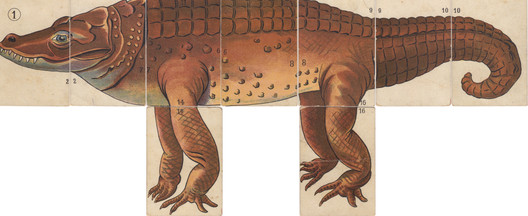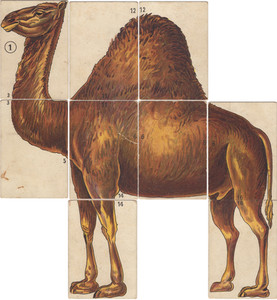Gerrymanders is a novel and amusing antique card game, combining a little dark humour, the surreal and (optionally) lots of noise. Produced to a high standard by Globe, designed in London, made in Bavaria.

Gerrymanders, Globe Series of Games - Box Front
From the rules card:
PRE-AMBLE
(Preliminary Canter).
Some animals escaped from the Zoo. In their wanderings they strolled into a sausage factory; and as a consequence of their inordinate curiosity, got chopped up in a mincing machine. The result was disastrous.
When the various pieces were sorted out by the startled sausage makers, the combinations were grotesque, all the animals were mixed up in hopeless confusion (this is where the laugh comes in) just for all the world, (as the factory proprietor said) as if they were GERRYMANDERS instead of self respecting animals.
Perhaps the players of the game will be able to arrive at a better result, but if not it will not matter, as one part of the game is as good as another, and the finish is all the more comical.
All the various parts of the animals after the sausage factory incident, a reconstruction.

Two of the hopelessly confused animals, or Gerrymanders, that the sausage makers managed to create from the various animal pieces.

All the animals restored to the self-respecting state they were in, before they left the zoo.

For a larger view of each animal, click your favourite below.
The ostrich, monkey, giraffe, crocodile, horse and camel, all "correctly" assembled.

How to play the Game - Paraphrased from the original rules
The game may be played by any number of players.
Each card has one or more numbers on its sides, cards are placed together so that these numbers correspond, like dominoes. The aim is to complete animals, known or novel.
Cards are shuffled and dealt until none remain.
The first player to the dealer's left who is able to play a "head" card with a No. 1 in a circle ①, begins by laying that card face up in the centre of the table.
The next player follows by playing a "neck" card, with a No. 2 or No 3 on it, as suits the "head". The play continues with each player in turn adding to the creature with appropriately numbered cards. If a player cannot add a suitable card they miss a turn.
When an animal is completed, the player laying the final card says "GERRYMANDER" and takes the animal (or trick).
Play continues with the next player laying down a No.1 card and the players build and complete it as before.
When all possible animals have been completed the scores are calculated. For each completed animal (or trick) 5 points are scored. For each card left in a player's hand 1 point is deducted. The game is completed when 15 points are scored by an individual player, or if playing as partners 30 points.
Another way of playing the game - Original wording from the rules
Recommended to all enemies of quietness.
Start as before. Should a player not possess the necessary card, he calls "GERRY" (pronounced "Jerry") the first one of the players who calls "MANDER", has the privilege of playing; and so the game proceeds in turn.
When an animal is completed, the first player who calls "GERRYMANDER" takes the trick. Should a player call "MANDER" when he has not got the necessary card, he is fined two points, otherwise the scoring is the same as in the first rules. This way of playing is guaranteed as an antidote to sleepiness.


Gerrymanders was "Designed in London - Made in Bavaria" and published by Globe Series in around 1900. Many of their card games were sold in these attractive wooden boxes.
It is a simple game but very well presented. I enjoy the humour, the macabre pre-amble and the anticipation of cacophony in the alternative rules.
Putting each animal together in a familiar form may provide a little satisfaction. Placing them together in the most unlikely and extraordinary ways is surely far more pleasurable and all the more so, if the newly created beasts are the product of communal effort and chance.
A note on the name of the game.
Gerrymander entered the English language via the Boston Globe on 26th March 1812. Governor Eldbridge Gerry had signed a bill allowing for electoral districts to be redrawn in Massachusetts, the effect of which was widely regarded as clearly unfair. The Boston Globe published this cartoon depicting the peculiar shape of one district as a salamander and calling it a Gerry-mander after the Governor.
Ever since, the word has been used to describe similar unfair practices designed to gain advantage in elections. By 1848 gerrymander and gerrymandering were in the Oxford English Dictionary and in popular use in the UK. At the end of the 19th Century, and early in the 20th, the word was used particularly frequently in the UK press as it reported on numerous disputes about electoral boundaries.
The salamander, which lent its second half to the portmanteau gerrymander, had long been a fabled and mystical beast that appeared in Medieval European bestiaries in various forms, as a winged dog, or a worm with a human head, before its fire defying abilities became its principal claim to bestial fame.
An amusing sounding word, much in use, at least by adults, with a lineage incorporating two ideas of unnaturally constructed and fantastical creations, a word curious enough to appeal to the young, with a resonance that might bring a smile to the adult purchasers. Whoever hit upon the name"Gerrymanders" must have felt they had pinned the tail on the donkey.













